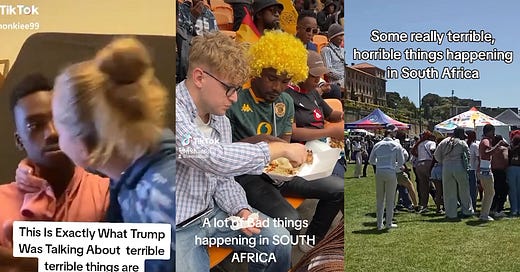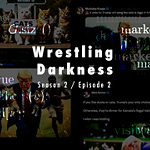Elaborate lies spewed at campaign rallies or spread on social media are par for the course in Trump’s America. But when an unfounded conspiracy theory becomes a state-sponsored soap opera, and that soap opera becomes the basis for U.S. foreign policy, that really should be some sort of red alert. Shouldn’t it?
On Feb 2, 2025, President Trump announced that South Africa is “under investigation.” A reporter had asked him why he posted to social media that the U.S. would suspend aid to South Africa. What was the offense?
That’s when Trump stumbled on the fateful phrase, “Terrible things are happening in South Africa.” These seven words would inspire waves of mockery, defiance, and interracial fellowship, as South Africans of all races posted videos and memes depicting kissing, dancing, and fully integrated, harmonious daily life as sarcastic examples of “terrible things.”
But Mr. Trump wasn’t finished. His executive order five days later proclaimed that the U.S. would no longer provide foreign aid or assistance to South Africa, and it established a refugee program for the white people in South Africa “who are victims of unjust racial discrimination” (meanwhile, legitimate refugee programs that bring nonwhite people to the United States had been indefinitely suspended).
By the time South African President Cyril Ramaphosa sat down in the Oval Office on May 21, 2025, Mr. Trump had prepared a stack of web clippings and a video montage that he thought would expose white genocide, embarrass Ramaphosa, and shock the world.
Journalists quickly fact-checked Trump’s presentation and found jaw dropping mistakes, such as photographs of events that did not take place in South Africa, and the inclusion of white crosses arranged for a political demonstration which Mr. Trump had mistaken for a mass grave for thousands of murdered white people.
White genocide, black fatigue
I was going to call Episode 11 of Wrestling Darkness, “White genocide, black fatigue” but then I decided to save the white genocide part for this, Episode 12.
“Black fatigue” is a term that I introduced to our guest Sisonke Msimang with a story about a white man who had attended a Black Lives Matter rally during the aftermath of George Floyd’s murder. You can see Episode 11 here.
In this episode, Sisonke explains that the “white genocide” narrative has roots in the pre-Apartheid, British colonial era of South Africa. In fact, she says, it was instrumental in the political campaign that installed the Apartheid regime in 1948.
Today’s incarnation of the white genocide fable is the project of Kallie Kriel and Ernst Roets, two activists of Dutch ancestry (Afrikaners) who have found allies among American white nationalists such as Tucker Carlson, Steve Bannon, and Charlie Kirk. Their performances on podcasts and other mediums have captivated President Trump since his previous administration. But this time around, Trump isn’t just watching the wrestlers in the ring; he’s joining them.
Foggy insinuations about “terrible things” have become on-camera accusations of genocide, and in between, the United States expelled the South African ambassador Ebrahim Rasool.
While the general public in South Africa has responded with flippancy and laughter, the political class and the business community have failed to see the humor. As Sisonke Msimang writes for The Intercept:
At first, the nation was furious with the Afrikaner organizations. The executive order was strongly worded and threatened sanctions. South Africans across all race groups criticized Kriel and Roets for convincing a foreign government to collectively punish the entire country over falsehoods. They were accused of peddling lies and disinformation and called traitors, as the nation worried that the U.S. would impose sanctions. Even AgriSA, a group that specifically represents the interests of farmers and has historically been dominated by Afrikaners, said “claims linking farm murders to the signing of the [Land Expropriation] act are baseless and irresponsible.”
As the anger mounted, AfriForum and Solidarity held a press conference in which they tried to distance themselves from Trump’s order. With his tail between his legs, Kriel backtracked on his claims of a white genocide. He has gone on to turn down Trump’s offer of asylum, insisting he was a patriotic South African who wanted to reaffirm “our commitment, our recommitment, to the country and all its people.”
Notes:
Click here for part 1 of this conversation, which focuses on Sisonke’s acclaimed memoir, Always Another Country.
During this episodes, we discuss Sisonke’s article, How Trump’s Embrace of Afrikaner “Refugees” Became a Joke in South Africa. You might also read On Trump and the invention of white victims in South Africa, which she published on Substack.
During this conversation, I referenced Episode 10 of Wrestling Darkness as I compared South African Apartheid to the Jim Crow Era in the United States.
Fights about racism are fruitless unless they lead to healing — Ep.10
Attempts to address racism are fruitless unless we find paths that lead to healing. This is one of many epiphanies I found in reading Sisonke Msimang’s acclaimed memoir, Always Another Country. Two days later, we talked at length about South Africa and the United States, our two, sister nations each struggling to free themselves from caste systems that …
















Share this post